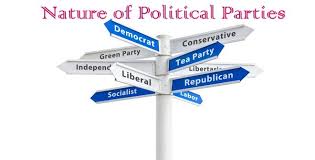
Week 9: Government and Policies: Political Parties
Political parties are historically and logically connected to democracy. This week we will examine the models of political parties and their relationship to democratic philosophy, with primary attention to normative rather than empirical models. Three dichotomous, analytical dimensions are developed: the parties' elite or mass focus, their collective or coalitional goals and their instrumental or expressive mode. Combining these dimensions results in eight abstract party concepts, each identified with particular theorists and practitioners. These concepts portray party, variously, as: governing caucus, cause advocate, ideological community, social movement, bureaucratic organization, rational team of office-seekers, urban machine and personal coalition. In an analysis of democratic theory, parallel dimensions are developed: the accessibility of leadership, voter goals and the character of popular participation. Particular kinds of parties are associated with these different concepts of democracy and with particular forms of government.


